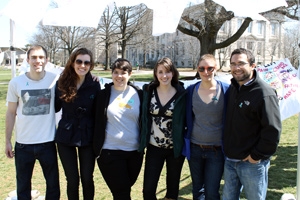On Campus
April at AU Focuses on Sexual Assault Awareness

Rappaport (right) and students during the Clothesline Project. Photo by Patrick Bradley.
The white t-shirts flapped in the April breeze with messages of both hope and anger – messages of survival. As part of AU’s Sexual Assault Awareness Month, these dozens of line-hung shirts on the university quad carried painted emotional words and images from rape and relationship violence survivors.
The Clothesline Project, as it’s called, counts itself part of the month’s packed calendar of 17 awareness-raising events on campus, a number almost double that of last year. Take Back the Night, another annual event, rallied students in a march across campus and also provided an open forum for survivors to speak out about their experiences.
As AU’s sexual assault prevention coordinator Daniel Rappaport knows, however, it’s not about the numbers of events and programs; it’s about the impact on students and the AU community.
“Just between the Clothesline Project and Take Back the Night, it can be such an empowering and moving calendar of different events to see,” he explains. “Many students don’t realize that these are [happening] on campus or that they have the support here on campus. That’s the biggest piece, not only for survivors but those supporting survivors.”
While Rappaport believes many students don’t realize the support they have on campus through the Wellness Center, the Dean of Students, the Counseling Center, and the Student Health Center, the month’s awareness-raising events are trying to and succeeding in changing that. Take Back the Night alone brought out hundreds of students, while the rest of the calendar continues to engage the university community.
“The student involvement in the groups that I support and groups like Women’s Initiative is incredibly powerful. Take Back the Night, which has long been solely a student-supported event, continues to be our largest turnout during Sexual Assault Awareness Month,” Rappaport says. “It’s really incredible to have the students running this huge event for the students. It’s such a great way for them to feel supported within the community.”
While student involvement is crucial, Rappaport is also quick to point out the support from university officials, whom he credits for “the increasing collaboration between my office, student groups, and other offices on campus to really bring programming to our students,” he says. “The administrative support is continuing to look to how to improve, not just when new laws come out. They’re assessing and reassessing to make sure that, as a university, we are providing the best resources, education, support, and environment for our students.”
Part of those resources and education include year-round programming by Rappaport and groups like PEERS, Men of Strength, and Green Dot, which he oversees. Peer Educators for the Elimination of Relationship and Sexual Violence (PEERS) is a group of typically 15 students who receive at least 30 hours of training around issues such as rape and stalking so that they can educate the campus through workshops geared toward classes, student organizations, and staff.
In fall 2013, PEERS will become a two credit hour course with more in-depth training.
Rappaport is excited about how the change will benefit students, as he says, “We can provide them with not only the activism standpoint but also the academic pieces.”
Between his position, these student groups, administrative support, and the calendar of events throughout April, Rappaport hopes the collective efforts will lead to the only thing that can end sexual violence anywhere – a culture shift.
“If anything, being a presence on campus can help create a culture where we can identify sexual violence, dating violence, and stalking,” he says. “It also provides students not just an opportunity to be active in that but also for them to really give back to the university and the students that make up their community.”
At the end of April, Rappaport – who even appeared on WAMU’s nationally syndicated The Diane Rehm Show this month to speak out for sexual assault awareness – hopes that student survivors and supporters will have a better understanding of every resource available to them while at AU. From PEERS to simply reaching out to Rappaport via email, phone call, or an office visit, the university has a number of options for anyone in need of help.
“I hope they take away a feeling that they are not alone, that they are supported on this campus. They’re not only supported by other survivors, other students, but also by their university,” he says.
Get involved with Rappaport and his office here.

